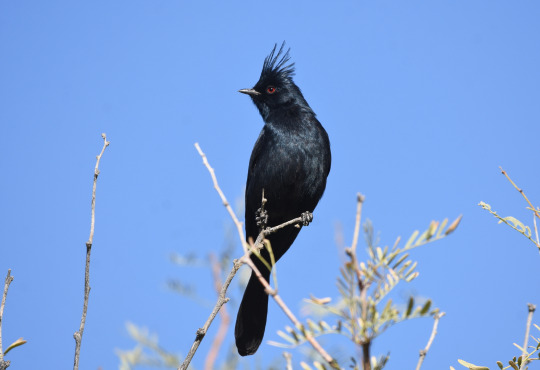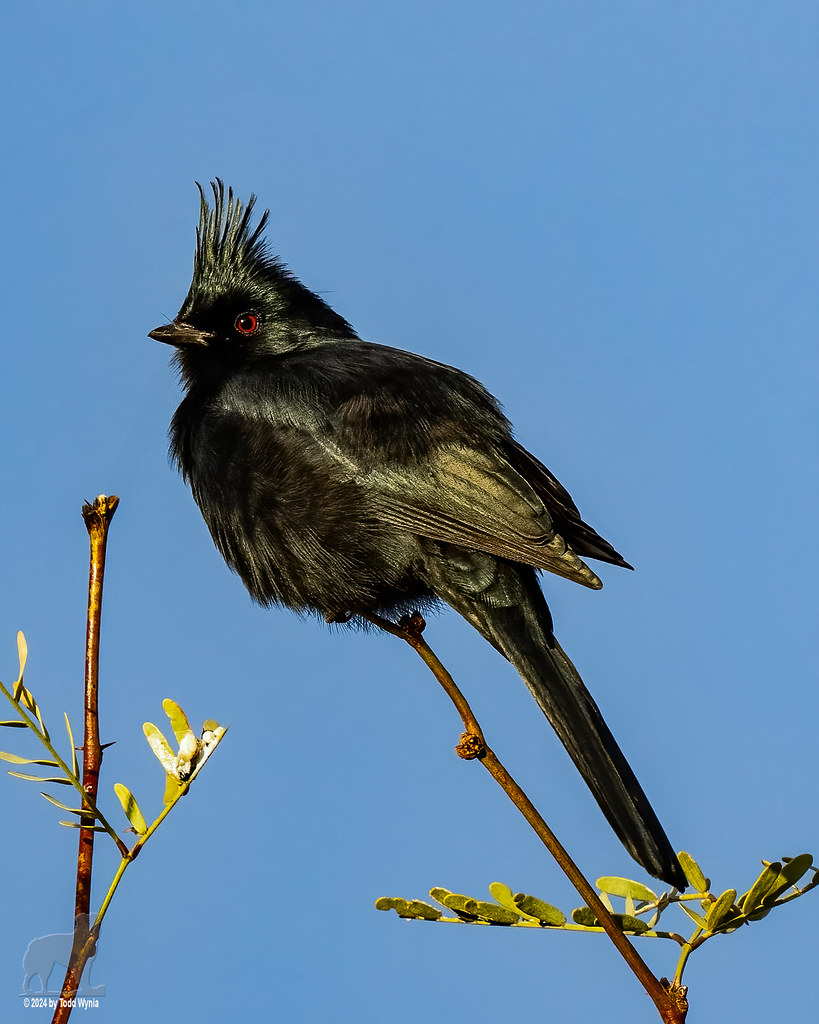#silky flycatcher
Explore tagged Tumblr posts
Text

Long-tailed Silky Flycatcher (Ptiliogonys caudatus), EAT A TASTY BERRY!!!, family Ptiliogonatidae, order Passeriformes, Panama
photograph by Ignacio Yúfera
#silky flycatcher#ptiliogonys#ptiliogonatidae#passeriformes#bird#ornithology#animals#nature#central america
3K notes
·
View notes
Text

Phainopepla nitens | Campylorhynchus brunneicapillus | Oroscoptes montanus | Harporhynchus crissalis
Plate IV | Die Nordamerikanische Vogelwelt (1891)
#bird art#bird illustration#vintage art#artists on tumblr#mimids#silky flycatchers#silky flycatcher#thrashers#sage thrasher#crissal thrasher#cactus wren
14 notes
·
View notes
Video
He of the shining robe by Todd Wynia Via Flickr: This is a phainopepla, the only U.S. member of a family of birds known as silky flycatchers. The name phainopepla derives from a Greek word meaning shining robe. Seems apt, given this guy's glossy appearance. Males are black like this guy. Females are more gray. But both sexes have that cool crest and red eye.
18 notes
·
View notes
Photo

Phainopepla
91 notes
·
View notes
Photo

Phainopepla, male, Tucson, Arizona, USA
Photograph by Mick Thompson, Eastside Audubon CC
38 notes
·
View notes
Text
BOTD: Long-tailed Silky-flycatcher

Photo: Patty McGann
"Striking bird unlikely to be confused with any other species. Very long tail and obvious crest stand out, in addition to soft blue-gray body with yellow-green head and flanks. Sometimes seen singly, but can also gather in flocks when fruiting trees (especially mistletoe) are abundant. Found in montane forest and edges."
- eBird
#birds#long tailed silky flycatcher#birds of north america#north american birds#flycatchers#silky flycatchers#passerines#birds of central america#birding#birdblr#birblr#bird watching#bird of the day#Ptiliogonys caudatus
95 notes
·
View notes
Text
Birdtober 11, 2024 "Flycatcher"

2 notes
·
View notes
Text

TO CATCH THE SILKY-FLYCATCHERS
(photo ref credit to biologist Dan Baldassarre, who snatched up these female & male Phainopeplas with one hand to quickly remove them from the net when they it hit side-by-side during a banding session)
#silky-flycatchers#phainopepla#Dan Baldassarre#bird banding#birds#bird art#I’m addicted to drawing his bird catching photos idk why
4 notes
·
View notes
Text
I love it when people who do art of animals they're really interested in tag it with like the species name and scientific name and everything. Like most artists would draw a one-off bird and tag it 'birds' but then you've got people out who have drawn every variation of bird imaginable and so they tag it with like. long tailed silky flycatcher or something. i'm sure the people who follow #long tailed silky flycatcher are very grateful for your contributions.
this isn't poking fun at people who do this btw, it's just that thing where people who are interested in something will see so much more wonder in it where most people will just be like 'it's a bird'. i actually think it's so wholesome.
#also the long tailed silky flycatcher tag does actually have more than one post in it apparently#this happens a lot with dinosaurs too#gaylight post
0 notes
Photo
“Long-tailed Silky-flycatcher“ by | Jess Findlay

“Long-tailed Silky-flycatcher“ by | Jess Findlay
5K notes
·
View notes
Text

Long-tailed Silky Flycatcher (Ptiliogonys caudatus), family Ptiliogonatidae, order Passeriformes, Costa Rica
photograph by Ġāl Röōt
#silky flycatcher#ptiliogonys#ptiliogonatidae#bird#ornithology#passeriformes#animals#nature#central america
560 notes
·
View notes
Text

"Long-tailed Silky-flycatcher".
Photo by Jess Findlay. Instagram.
> j-k-i-ng
0 notes
Video
Phainopepla (Phainopepla nitens), adult male DSD_8998 by fotosynthesys
#phainopepla#Phainopepla nitens#silky-flycatchers#Ptiliogonatidae#bird#Nevada#United States#Nye Co.#flickr
2 notes
·
View notes
Text
BOTD: Phainopepla

Photo: Christopher Lindsey
"In the desert southwest, Phainopeplas and mistletoe rely on each other. Phainopeplas feed heavily on berries of this parasitic plant; after the berries pass through the bird's digestive tract, the seeds often stick to branches of mesquite or other trees, where they can sprout new mistletoe clumps. Flocks of these slim and elegant birds may gather to feed on seasonally abundant crops such as elderberries. At other times, Phainopeplas are solitary, each bird defending a few small trees with several large clumps of mistletoe, and attempting to drive away any other fruit-eating birds that come close."
- Audubon Field Guide
#birds#phainopepla#birds of north america#north american birds#flycatchers#silky flycatchers#phainopeplas#birds of the us#birds of mexico#birding#birdblr#birblr#bird of the day#Phainopepla nitens
56 notes
·
View notes
Photo

Long-tailed Silky-flycatcher
#long tailed silky flycatcher#silky flycatcher#Ptiliogonys caudatus#Passeriformes#Ptiliogonatidae#Ptiliogonys#bird#upl
873 notes
·
View notes

